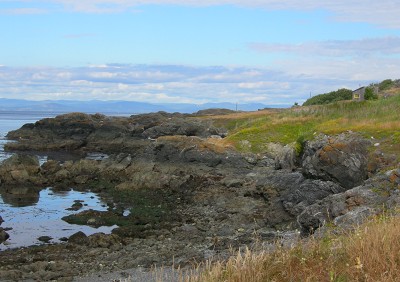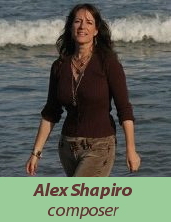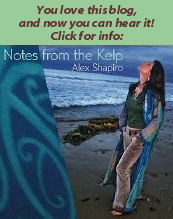July 17, 2007
Let’s play “stump the biologist”!

 …listen
…listen
 …about the music
…about the music
Slightly mysterious.
This may just look like a bunch of boring rocks to you, but to me, it’s an invitation to peer into the private lives of tons of marine creatures and sea vegetables. And that’s just what I got to do this weekend, as a happy participant in the annual beach walk that the world famous Friday Harbor Laboratories hosts. A dream come true for this wannabe marine biologist: there were several scientists along for the day, and I spent the better part of a couple of hours with one who was patient enough to answer all my burning questions about kelp, algae, eel grass, sponges, snail eggs and nudibranchs (no, those aren’t something you see at a peep show).
I was fascinated to learn that in fact, there are no answers yet to two of my longtime queries: 1. why do sea stars choose to glom onto each other in packs? and 2. what makes them such a wide range of color?
It’s good to be reminded that in the face of advanced marine science, sometimes the simplest questions even a child (or a child-like adult like me) might ask remain as quizzical to the experts as to the rest of us. I find it oddly reassuring that, as with music, it’s even more compelling and wonderful when the mysteries remain.





Greg Amos said,
July 17, 2007 @ 8:27 am
I know nothing about kelp, moss or eel grass. But now that I live amidst the farms of Lancaster county I keep my own grass pretty neat and frequently ride my scooter around the farm roads. It’s extraordinarily buccolic and though there aren’t any biologist in the immediate vicinity, I can always stop and ask a farmer an impromptu question.
There is stewardship of the land here that I’m sure compares with what you’re living in the land of kelp.
Alex Shapiro said,
July 17, 2007 @ 8:52 am
Yup, Greg, I agree! That sense of stewardship is exactly what I refer to often when I talk about the joy of living among acres of trees. Regardless of one’s property taxes, we never really “own” the land; we’re visitors who get the privilege of staying for a prolonged time in a space that existed long before we did, and– hopefully- will continue on long after we’re gone.